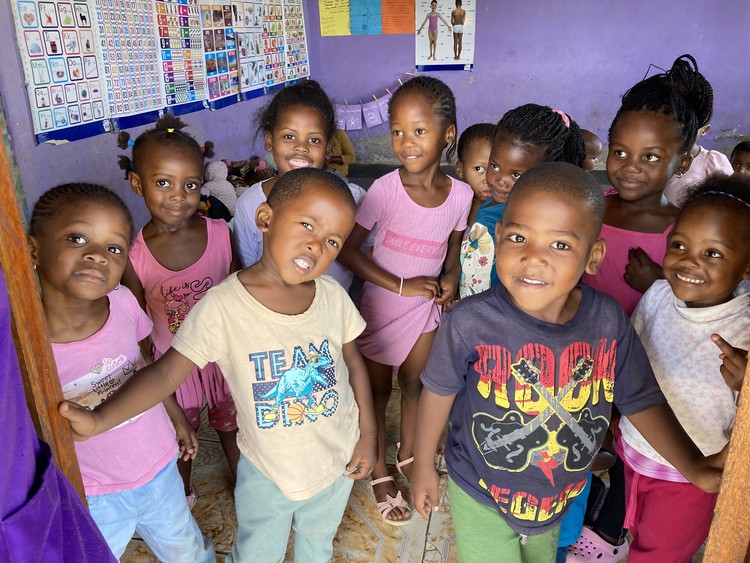
7 May 2024
Thanks to donations, Rosey Mbikwana can now offer two meals a day to the children in her day care centre in Mthatha. Photo: Liz McGregor
A roomful of toddlers bursts into a chant: “Eating time! Eating time!” as pots of yoghurt are handed to each. Then each child is given a spoon and little heads are bowed over the pots, scooping out every last mouthful.
In October last year, GroundUp reported Rosey Mbikwana’s despair at the hunger she witnessed every day in her day care centre in Mthatha. Some of the children were arriving with only a small bottle of sugar water to last the day, she said, and she couldn’t afford to feed them herself. In response to the article, friends and family committed to a joint monthly contribution of R2,500 to help Mbikwana feed her charges.
In March this year, we visited Ma Rosey’s Day Care and Creche. The transformation was dramatic. On this relatively modest amount, she is able to give the children two meals a day. On arrival, they are given nutritionally enhanced porridge. Mid-morning the main meal is served. “On Mondays, it is rice and chicken and veg.” explains Mbikwana. “Tuesday is macaroni and tinned fish. Wednesday pap and maas. Thursday is samp and beans. Friday is pap and soup.”
The third meal of the day is provided by parents: usually bread and egg or bread and margarine. Mbikwana provides the food for those children who don’t bring it.
She is a changed person: positive and cheerful, so relieved is she to be able to feed the children. Because, unlike other day care centres in the area, she provides food, the demand for places in her centre has increased and she now has more than 30 children in her care. Fees bring her an income of around R3,000 a month. So, with the additional R2,500 she has R5,500 to run the crèche and meet her own family’s needs. A civic organisation pays an assistant R1,200.
Most of the children are being raised by young, single mothers, or by grandmothers because the mother is still in school. Some have jobs but most subsist on social grants and struggle to pay the crèche fees.
“Some children come for a few months and then they stop coming. I go to the home and the mother says she can’t pay the fees or send a lunchbox with the child. There is no food in the home. So, I say, bring the child anyway. I will find food.”
Now 57, Mbikwana grew up under apartheid and is used to struggle. She left school armed only with Standard 6 (Grade 8) and made a living as a domestic worker in Johannesburg before returning, in 2008, to her mother’s home in Joe Slovo Park in Mthatha to care for her. After her mother died she stayed on with her three children. Jobs in Mthatha are scarce and, in 2021, she started the day care centre in a room in her house as a source of income.
Joe Slovo Park is flanked by Nelson Mandela Park and Chris Hani Park. The story is that they are named after the revolutionary heroes of the early years of democracy because Mandela himself flew to Mthatha to prevent an attempt to evict the people living on the land, which was state-owned.
Mbikwana’s street is pitted with potholes and lined with houses doubling as small businesses: spaza shops, taverns, and an outdoor tailor sitting at an old Singer sewing machine, protected from the sun by a small gazebo. There are at least three day care centres. The municipality provides water and electricity but there is no piped sewage system. In Rosey’s yard are a row of small chairs with a hole in the seat, under which is a potty.
After much struggle with the bureaucracy she has finally acquired conditional registration as a non-profit organisation which means she can raise funds.
Permanent registration, which means she would be entitled to a subsidy from the Department of Basic Education, is predicated on an increasing series of demands. Inspectors from the department visit regularly, with ever lengthening lists of what Mbikwana needs to do in order to secure permanent registration.
“They say I have to divide the yard and build a separate room with a separate entrance and separate toilets for the children.”
The department does not provide any funds, either for day-to-day running of the creche or for the infrastructure they require Mbikwana to build. “They say I must fundraise.”
“I don’t understand because we are a small business, starting afresh.”
She also has to set up a five-person governance structure, with a chairperson, a secretary and a treasurer. “They can’t give you a (permanent) non-profit organisation without that structure. You must have one helper to cook. You have to register each child every day,” she says.
“We complain but we can’t do anything about it.”